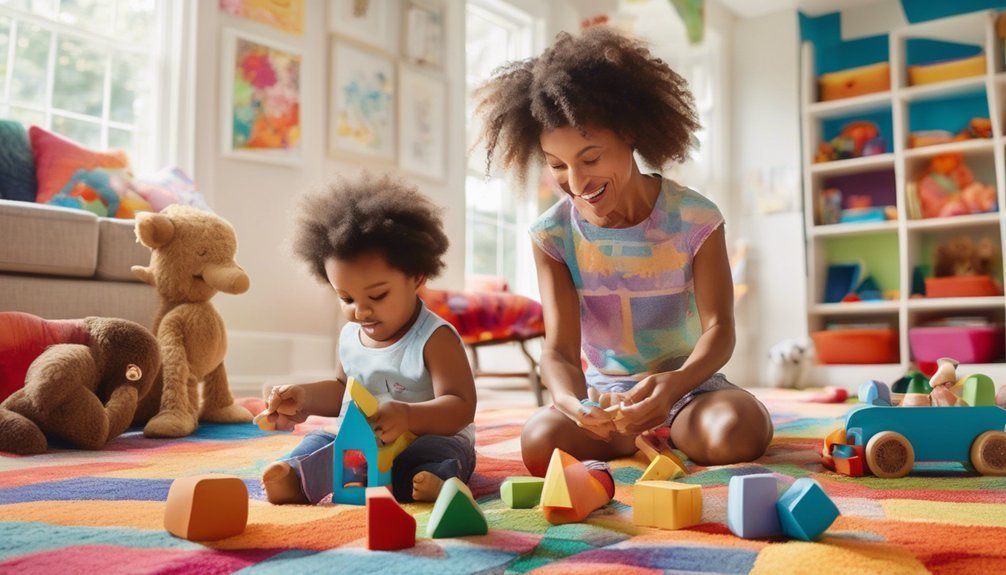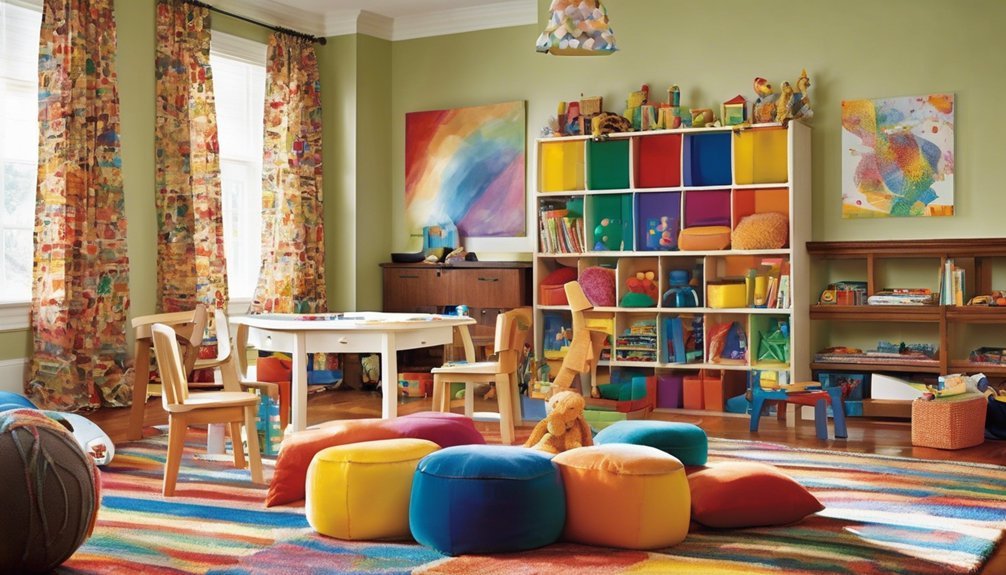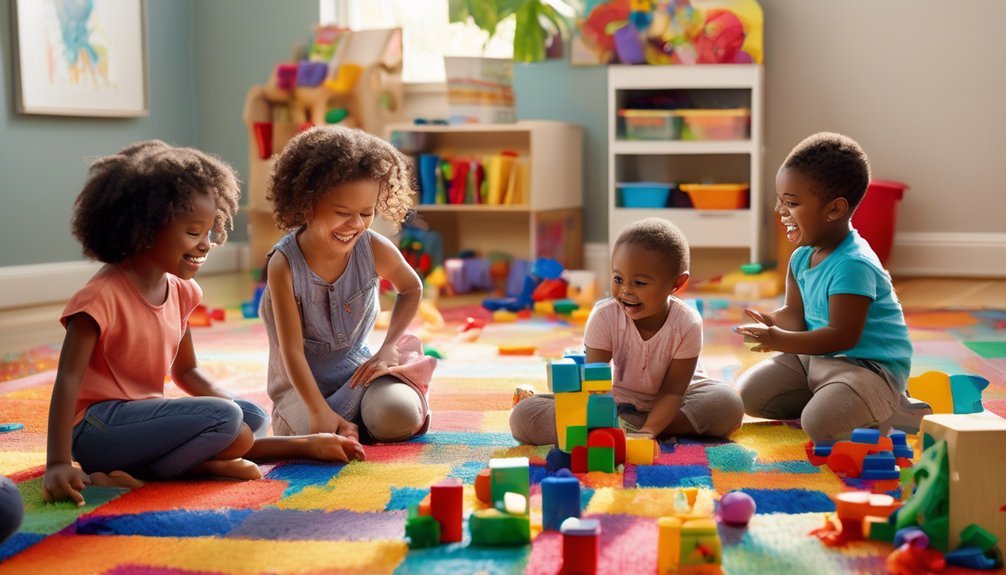As a parent or caregiver, you play a vital role in your child’s early brain development. During these formative years, every interaction and activity can significantly impact their growth. By incorporating simple yet effective strategies into your daily routine, you can foster an environment that encourages learning and emotional well-being. Discover how small changes can lead to lasting benefits for your child’s future—there’s much more to explore in this important journey.
Key Takeaways
- Engage in stimulating activities like playing, reading, and exploring to foster brain connections and future learning potential.
- Establish consistent daily routines to create a safe environment that enhances emotional regulation and reduces anxiety.
- Encourage meaningful conversations and active listening to promote cognitive and emotional growth, including empathy development.
- Read aloud regularly to strengthen bonds, enhance vocabulary, and nurture a love for books and critical thinking skills.
- Provide hands-on science projects and outdoor adventures to encourage curiosity, exploration, and connection with the environment.
The Importance of Early Brain Development

When you consider that a child’s brain develops most rapidly during the first few years of life, it’s clear how crucial this period is for their overall growth.
During these critical periods, their brains exhibit remarkable neuroplasticity benefits, allowing them to form connections that shape their future learning and emotional well-being. Engaging in stimulating activities—like playing, reading, and exploring—helps harness this incredible ability.
You’re not just nurturing their intellect; you’re also fostering their capacity for empathy and resilience. Each interaction lays the groundwork for a strong foundation, ensuring they thrive as they grow.
Engaging in Meaningful Conversations
Engaging in meaningful conversations with young children plays a vital role in their brain development. When you share stories, use storytelling techniques to captivate their imagination. This not only nurtures their creativity but also enhances their vocabulary and comprehension skills.
As you talk, practice active listening—show genuine interest in their thoughts and feelings. This connection fosters a sense of trust, encouraging them to express themselves freely. Ask open-ended questions that spark curiosity and invite deeper discussions.
Simple moments of conversation can significantly impact their cognitive and emotional growth. Remember, it’s not just about talking; it’s about building a bridge of understanding. Your engagement today lays the foundation for their future learning and relationships. Embrace these precious moments together!
Reading Aloud to Your Child
Reading aloud to your child not only strengthens your bond but also plays a crucial role in their cognitive development. When choosing books, consider diverse story themes and engaging characters.
Use different character voices to bring the story to life, capturing your child’s imagination. Create reading routines that make this a cherished time together. Incorporate interactive questions during the story to enhance comprehension strategies and encourage dialogue.
This not only supports literacy milestones but also sparks genre exploration, introducing your child to various writing styles. Remember, each reading session offers a chance to nurture their love for books and develop critical thinking skills.
Encouraging Creative Play

While it might seem like just fun and games, encouraging creative play in young children is vital for their brain development. Engaging in imaginative storytelling allows your child to explore emotions and ideas, fostering critical thinking skills.
Set aside time for open-ended play, where they can create their own narratives and characters. Incorporate sensory experiences, like playing with clay or water, to stimulate their senses and spark creativity.
These activities not only strengthen their cognitive abilities but also enhance their emotional resilience. Remember, it’s through these playful moments that your child learns problem-solving and collaboration.
Providing a Stimulating Environment
Creating a stimulating environment for your child is essential, as it lays the foundation for their cognitive growth and exploration. Engaging in sensory play allows them to experience textures, sounds, and colors, sparking curiosity and creativity.
Set up areas where your child can touch, manipulate, and experiment with different materials like sand, water, or clay.
Incorporating nature exploration can further enhance their learning. Take walks in the park, observe plants and animals, or simply let them play outside.
Nature offers endless opportunities for discovery and connection.
Establishing Routines and Consistency
A nurturing environment goes hand in hand with establishing routines and consistency in your child’s daily life. Children thrive on predictability, which helps them feel safe and secure.
By creating daily routines, you’re not just organizing their day; you’re also fostering their brain development. Routine flexibility is important, too. Life is unpredictable, and allowing for some variations can teach your child adaptability while maintaining a sense of stability.
Consistency benefits their emotional regulation, making transitions smoother and reducing anxiety. Aim for a balance—structured enough to provide comfort, yet flexible enough to accommodate life’s little surprises.
When children know what to expect, they can focus on exploring and learning, paving the way for a healthier, happier childhood.
Promoting Social Interaction

As your child interacts with peers, they develop essential social skills that lay the foundation for healthy relationships and emotional well-being. One effective way to promote this interaction is through playdates.
The playdates benefits are immense, fostering cooperation, sharing, and conflict resolution. Encourage your child to invite friends over or join group activities like sports or art classes.
These experiences not only enhance their social skills but also boost confidence and creativity. Remember, it’s in these moments of laughter and teamwork that your child learns to navigate social dynamics.
Incorporating Music and Movement
While you may think of music and movement as just fun activities, they play a crucial role in your child’s development. Engaging in musical games and rhythmic activities stimulates your child’s brain, enhancing their cognitive skills and emotional intelligence.
When you dance or sing together, you’re not only creating joyful memories but also fostering a sense of connection and security. These experiences can improve language development and coordination, helping your little one to express themselves more freely.
Integrating music and movement into daily routines can be as simple as clapping to a beat or playing an instrument together. So, let loose, have fun, and watch your child’s brain flourish through the magic of music and movement.
Supporting Problem-Solving Skills
When you encourage your child to tackle challenges, you’re not just helping them solve problems; you’re also building their confidence and critical thinking skills. Engaging in problem-solving games can spark your child’s curiosity and enhance their ability to think critically.
Whether it’s a simple puzzle or a more complex board game, these activities stimulate their brains and foster a sense of achievement.
Incorporate hands-on activities like building blocks or scavenger hunts that require your child to strategize and think creatively. This approach not only nurtures problem-solving skills but also strengthens your bond as you work together.
Limiting Screen Time

Encouraging your child to develop problem-solving skills naturally leads to a discussion about screen time, as balancing digital interaction with hands-on experiences is key.
Experts recommend following established screen time guidelines, suggesting limited use for young children. Too much screen time can hinder creativity and critical thinking, while hands-on activities spark curiosity and exploration.
By setting boundaries, you foster a healthy relationship with technology, helping your child develop essential digital literacy skills. Engage them in active play and real-world problem-solving, creating a rich environment for growth.
Nurturing Emotional Intelligence
Nurturing emotional intelligence in your child is essential for their overall development, as it helps them understand and manage their feelings while fostering empathy for others.
Encourage emotional expression by helping them name their feelings and discussing different emotions openly. When your child sees you model empathy, they’re more likely to develop this crucial skill themselves.
Engage in conversations about how others might feel in various situations, promoting empathy development. Use stories or role-play to illustrate emotional scenarios, allowing your child to practice responding with kindness and understanding.
Remember, creating a safe space for emotional expression helps your little one feel validated, strengthening their emotional foundation.
Encouraging Curiosity and Exploration
How can you spark your child’s natural curiosity and sense of exploration? Start by providing a rich environment filled with hands-on activities and interactive play.
Encourage nature exploration and outdoor adventures, allowing your child to connect with their surroundings. Here are some ideas to promote curiosity-driven projects:
- Offer sensory experiences with different textures, sounds, and smells.
- Create experimentation opportunities with simple science projects at home.
- Organize discovery learning sessions through visits to parks or nature trails.
- Engage in imaginative play that fosters creativity and problem-solving.
Frequently Asked Questions
How Does Nutrition Impact Early Brain Development in Children?
Nutrition plays a crucial role in your child’s brain growth. When kids face nutritional deficiencies, it can hinder their cognitive development and overall well-being. Prioritizing balanced meals ensures their brains thrive during crucial developmental stages.
What Role Does Genetics Play in Brain Development?
You might notice how certain traits run in families, and that’s where genetic influence comes in. Hereditary factors shape brain development, impacting everything from intelligence to emotional regulation, intertwining nature and nurture in your child’s journey.
When Should I Be Concerned About My Child’s Developmental Milestones?
You should watch for red flags if your child’s milestones seem delayed compared to peers. Regular milestone tracking helps you stay informed and proactive, ensuring your little one’s growth stays on a healthy path. Trust your instincts!
Can Environmental Toxins Affect Brain Development in Early Childhood?
Yes, environmental toxins can impact brain function in early childhood. When kids face toxic exposure, it may hinder their development. Staying informed and minimizing their exposure helps protect their precious, growing minds. You’re not alone in this concern.
How Can I Assess My Child’s Cognitive Development at Home?
You can assess your child’s cognitive development at home by engaging in play activities and using observation techniques. Watch how they solve problems, interact with others, and express creativity to better understand their growth and abilities.
Conclusion
In conclusion, nurturing early childhood brain development is vital for your child’s future success. Did you know that 90% of a child’s brain develops by age five? By engaging in meaningful conversations, reading aloud, and encouraging creative play, you’re laying a strong foundation for their cognitive and emotional growth. Remember, a stimulating environment and limited screen time can significantly enhance their learning experience. Together, you can help your child thrive and develop the skills they need for life.




